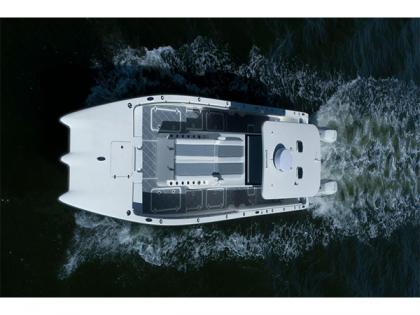Thierry Birles On Why It Is Important To Consider Technology Integration in Restoration Projects
By ANI | Updated: June 27, 2025 14:08 IST2025-06-27T14:02:28+5:302025-06-27T14:08:49+5:30
VMPL New Delhi [India], June 27: Thierry Birles is not someone who is often taken unawares, mostly because his ...

Thierry Birles On Why It Is Important To Consider Technology Integration in Restoration Projects
VMPL
New Delhi [India], June 27: Thierry Birles is not someone who is often taken unawares, mostly because his analytical mind plays out most scenarios already before they happen. The current trend happening in the yacht restoration scene is something that had crossed his mind before, and now he is seeing it playing out. Thierry Birles has transformed classic yacht restoration from a nostalgic hobby into a sophisticated blend of heritage preservation and technological advancement. His work spans the prestigious regatta circuits of the Mediterranean, British Isles, and Caribbean, where million-dollar vessels all benefit from his meticulous attention to detail.
His background as a retired professional maritime legal advisor to top world shipping companies provides him with unique insights into regulatory compliance and international maritime law. This knowledge proves invaluable when navigating the complex requirements of modern yacht restoration projects.
Honoring Maritime Heritage Through Strategic Technology Adoption
Classic yacht restoration presents a fascinating challenge: how to honor maritime heritage while meeting contemporary safety and environmental standards. Thierry Birles has mastered this delicate balance through his work with vessels ranging from 24-meter sailing yachts to 65-meter motor yachts. His restoration philosophy centers on preserving historical integrity while incorporating modern technologies that enhance performance and comfort.
The global yacht maintenance and refit market surpassed $2.5 billion in 2023, with Europe accounting for approximately 30 percent of this expanding sector. Birles operates within this lucrative market as both craftsman and strategist, understanding that successful restoration requires more than technical skill. "When restoring classic yachts, we often encounter challenges such as sourcing authentic materials or adapting modern safety features without compromising the vessel's historic essence. It's a complex but rewarding process," Birles explains.
Technology plays a crucial role in solving these restoration challenges. Advanced materials science allows restorers to replicate historical components with greater durability and safety. Digital scanning and 3D modeling preserve original specifications while enabling precise reconstruction of damaged elements. Modern propulsion systems can be discreetly installed to meet current emission standards without altering the vessel's classic appearance.
Environmental Compliance as Competitive Advantage
The maritime industry faces mounting pressure to reduce its environmental impact, with the International Maritime Organization setting targets for a 50 percent reduction in greenhouse gas emissions by 2050. Birles views these regulatory changes as opportunities rather than obstacles, helping clients transform compliance requirements into competitive advantages.
Thierry Birles' cultural consulting work with Western corporations adapting to Asian and Caribbean markets has taught him valuable lessons about regulatory navigation. Each region maintains distinct environmental standards and cultural expectations regarding maritime activities. Success requires understanding these nuances and leveraging them strategically rather than simply meeting minimum requirements.
"Our maritime traditions are not just relics of the past; they are living, breathing aspects of our coastal communities that can drive sustainable tourism and economic growth," Birles states. This perspective drives his broader initiative to preserve maritime heritage through sustainable tourism development. The program connects local communities, maritime museums, and tourism boards to create immersive experiences showcasing traditional maritime skills and knowledge.
Traditional shipbuilding techniques often incorporated inherently sustainable practices developed over centuries of resource scarcity and environmental adaptation. Modern restoration projects can learn from these historical methods, discovering solutions to contemporary challenges through careful study of traditional craftsmanship. This knowledge transfer benefits both heritage preservation and environmental compliance efforts.
Scientific Partnerships and Future Vision
Thierry Birles has expanded his influence beyond restoration work by facilitating partnerships between luxury yacht owners and marine researchers. The typical oceanographic research vessel costs upwards of $50,000 per day to operate, placing extended research missions beyond the reach of many scientific institutions. Birles recognized this funding gap and began connecting scientists with yacht owners whose vessels sit idle for most of the year.
During the first half of 2025, Birles facilitated over 45 research expeditions aboard private vessels, ranging from tracking white sharks in the Mediterranean to studying black coral reefs in Indonesia. These partnerships provide mutual benefits: scientists gain access to expensive research platforms while yacht owners contribute meaningfully to ocean conservation efforts.
The restoration industry continues evolving as more individuals recognize the value of preserving maritime heritage. Birles anticipates increased investment in restoration projects that extend vessel lifespans while contributing to industry sustainability. This trend aligns with growing consumer demand for authentic luxury experiences and environmental responsibility.
The Many Purposes of Technological Integration
Thierry Birles' work demonstrates that technology integration in restoration projects serves multiple purposes beyond mere modernization. Smart systems can monitor vessel conditions continuously, preventing deterioration and reducing maintenance costs. Advanced materials provide superior performance while maintaining historical appearance. Environmental monitoring equipment enables research partnerships that justify operational expenses while contributing to scientific knowledge.
Birles believes the future of classic yacht restoration depends on successfully balancing heritage preservation with technological advancement. He has proven that this balance creates value for owners, contributes to scientific research, and supports environmental conservation. His work establishes a template for responsible luxury that honors the past while embracing the future.
(ADVERTORIAL DISCLAIMER: The above press release has been provided by VMPL.will not be responsible in any way for the content of the same)
Disclaimer: This post has been auto-published from an agency feed without any modifications to the text and has not been reviewed by an editor
Open in app